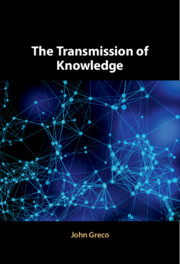Book contents
- The Transmission of Knowledge
- The Transmission of Knowledge
- Copyright page
- Contents
- Preface
- Acknowledgments
- 1 Introduction
- 2 The Framework Presented
- 3 Joint Agency and the Role of Trust in Testimonial Knowledge
- 4 Social Norms and Social Sensibilities
- 5 A Unified Account of Generation and Transmission
- 6 The Framework Extended
- 7 Education and the Transmission of Understanding
- 8 Reductionism and Big Science
- 9 Social Religious Epistemology
- Appendix: The Garbage Problem
- Bibliography
- Index
1 - Introduction
Testimony and the Transmission of Knowledge
Published online by Cambridge University Press: 21 August 2020
- The Transmission of Knowledge
- The Transmission of Knowledge
- Copyright page
- Contents
- Preface
- Acknowledgments
- 1 Introduction
- 2 The Framework Presented
- 3 Joint Agency and the Role of Trust in Testimonial Knowledge
- 4 Social Norms and Social Sensibilities
- 5 A Unified Account of Generation and Transmission
- 6 The Framework Extended
- 7 Education and the Transmission of Understanding
- 8 Reductionism and Big Science
- 9 Social Religious Epistemology
- Appendix: The Garbage Problem
- Bibliography
- Index
Summary
Chapter 1 begins by invoking an intuitive distinction between the generation of knowledge and the transmission of knowledge. Very roughly, generation concerns coming to know “for oneself,” as when one reasons to a conclusion on the basis of good evidence. Transmission concerns coming to know “from someone else,” as when one is told by someone else who knows. Section 1.1 argues that some but not all testimony is at the service of knowledge transmission, with the result that some but not all testimonial knowledge is transmitted knowledge. Section 1.2 redraws some familiar categories in the epistemology of testimony so as to better characterize our target and related phenomena, better frame our questions, and better see the possible answers. Finally, a central thesis of the book is introduced and discussed: that knowledge transmission is irreducible to knowledge generation, and for that reason requires its own theoretical treatment. More specifically, it is argued that an adequate account of transmission must go beyond the usual theoretical resources of traditional epistemology – that is, beyond those resources that the tradition uses to theorize knowledge generation.
Keywords
- Type
- Chapter
- Information
- The Transmission of Knowledge , pp. 1 - 24Publisher: Cambridge University PressPrint publication year: 2020

